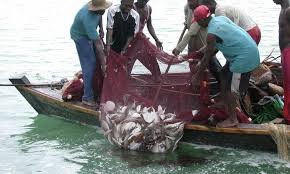Benin, Ghana and Togo have signed a pact to work together to reduce illegal, unreported and unregulated (IUU) fishing in the Gulf of Guinea.
Benin and Togo completed their first joint patrol operation in mid-December. It was funded by the European Union’s Improved Regional Fisheries Governance in Western Africa program, known as PESCAO. Ghana signed the agreement in late December.
Besides at-sea patrols, the countries will share information from the Regional Monitoring, Control and Surveillance Centre in Ghana, which was formed by the Fisheries Committee for the West Central Gulf of Guinea (FCWC) in 2021.
Other partners include the Regional Maritime Security Centre for West Africa in Côte d’Ivoire; European Fisheries Control Agency; Multinational Maritime Coordination Centre; and Trygg Mat Tracking, a fisheries intelligence analysis company. Additional funding is supplied by the Norwegian Agency for Development Cooperation, according to SeafoodSource.
Duncan Copeland, executive director of Trygg Mat Tracking, said the company was happy to support regional fisheries patrols in West Africa. The region has been targeted for decades by foreign distant-water fishing fleets, mostly from China, leading to a severe decline in fish stocks, loss of income for artisanal fishermen and increasing food insecurity.
“At–sea patrols are a key component of effective fisheries enforcement, but only when well–coordinated, well–planned and well–informed,” Copeland said in a report on the company’s website. “We congratulate the FCWC and the Regional MCS Centre for their leadership in making this a reality.”
When Ghana signed the agreement, Seraphin Dedi Nadje, secretary-general of FCWC, said it will help improve the coordination, development and implementation of national and regional fisheries plans in line with the African Union’s integration agenda and support the United Nations’ sustainable development goals, Business Ghana reported.
Nadje added that the region’s fisheries sector could be best developed if all member states cooperate on management practices.
Illegal fishing costs West Africa almost $1.95 billion across the fish value chain and $593 million per year in household income. IUU fishing also has been linked to piracy, human trafficking, and drugs and weapons smuggling.
The countries’ pact is viewed as evidence that they are responding to the concerns of artisanal fishermen and are committed to growing their blue economies. Côte d’Ivoire also is expected to be part of the agreement but has not yet signed on, according to SeafoodSource.
Ghana has urged neighboring countries to implement coordinated closed fishing seasons to prevent the further decline of fish stocks in the Gulf of Guinea. Ghana imposes a two-month closed season for industrial trawlers and a one-month closed season for small-scale fishermen.
Paul Odartei Bannerman, deputy executive director of Ghana’s Fisheries Commission, said the effect on the region’s fish stocks would be insignificant if only Ghana observed a closed season, according to a report by Ghanaian newspaper Daily Graphic.
Ghana’s small pelagic fish populations, such as sardinella, have dropped 80% in the past two decades. One species, sardinella aurita, already is fully collapsed. Without governmental intervention, full collapse of Ghana’s fisheries is likely in less than 10 years, according to the Environmental Justice Foundation.
Credits/ADF

